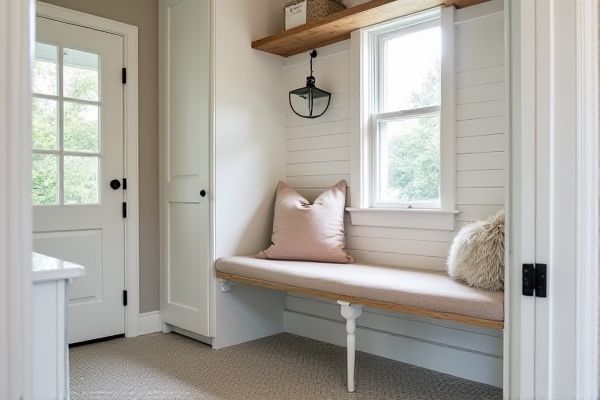
Mudroom hex tiles offer a unique geometric pattern with durability and slip resistance, making them ideal for high-traffic entry spaces, while subway tiles provide a classic, clean look with easy maintenance and versatility in design. Discover the best choice for your mudroom by exploring the full comparison in this article.
Table of Comparison
| Feature | Mudroom Hex Tile | Subway Tile |
|---|---|---|
| Shape | Hexagonal | Rectangular |
| Common Size | 2"-4" per hex side | 3" x 6" |
| Material | Porcelain, Ceramic, or Natural Stone | Ceramic or Porcelain |
| Slip Resistance | High; ideal for mudrooms | Moderate; less textured |
| Installation Pattern | Patterned or random hex layout | Classic subway brick pattern |
| Durability | Very durable, withstands heavy traffic | Durable but less impact resistant |
| Maintenance | Easy to clean, grout may need more care | Easy to clean and maintain |
| Aesthetic Appeal | Modern, geometric, trendy for mudrooms | Timeless, classic subway look |
| Cost | Moderate to high | Low to moderate |
Introduction to Mudroom Tile Choices: Hex vs Subway
Mudroom tile choices often come down to hex tiles and subway tiles, each offering unique design and functional benefits. Hex tiles provide a geometric, visually engaging pattern with enhanced slip resistance, making them ideal for high-traffic, muddy areas. Subway tiles deliver a clean, classic look with easy installation and maintenance, suitable for creating a bright, timeless mudroom space.
Aesthetic Differences: Hex Tile vs Subway Tile
Hex tile in mudrooms offers a unique geometric pattern that creates a visually striking and contemporary aesthetic, often enhancing the space with a sense of depth and texture. Subway tile provides a classic, timeless look with clean, linear lines that contribute to a more traditional or minimalist design. The choice between hex tile and subway tile significantly influences the mudroom's overall ambiance, with hex tiles delivering bold visual interest and subway tiles promoting simplicity and elegance.
Durability and Maintenance Comparison
Mudroom hex tiles offer superior durability due to their thicker, denser porcelain composition, resisting scratches and heavy foot traffic better than subway tiles, which are often made from ceramic and prone to chipping. Hex tiles feature textured surfaces that provide enhanced traction, reducing slip hazards in wet, muddy environments, whereas subway tiles tend to have smoother finishes that can become slippery when wet. Maintenance for hex tiles is generally easier, as their grout lines help conceal dirt and mud, while subway tiles require more frequent cleaning to avoid visible stains and grout discoloration.
Slip Resistance in Mudrooms: Which Tile Wins?
Mudroom hex tiles offer superior slip resistance due to their numerous grout lines and textured surface, enhancing traction in wet or muddy conditions. Subway tiles have fewer grout lines and a smoother surface, which can become slippery when wet. Your best choice for a mudroom with optimal safety is hex tile, reducing the risk of slips and falls.
Installation Process: Ease and Cost
Mudroom hex tile offers a straightforward installation process with interlocking shapes that provide a seamless pattern, often requiring more precision but less cutting compared to subway tile. Subway tile installation tends to be quicker due to its rectangular shape and standard size, making it easier for DIY projects, but it might involve more grout lines and potential for misalignment, impacting labor costs. Your choice depends on balancing installation time and cost, where hex tiles may have higher upfront labor fees while subway tiles might demand more grout maintenance over time.
Design Versatility and Style Options
Mudroom hex tiles offer a unique geometric pattern that creates a visually striking and modern aesthetic, making them ideal for contemporary and eclectic design schemes. Subway tiles provide classic, clean lines with a timeless appeal that suits traditional, farmhouse, or minimalist styles, available in various colors and finishes for customization. Both tile types deliver versatile options, but hex tiles stand out for bold statement designs, while subway tiles excel in creating subtle, elegant backdrops.
Cost Analysis: Hex Tile vs Subway Tile
Hex tile typically costs more per square foot than subway tile due to its intricate shape and installation complexity, with prices ranging from $5 to $15 compared to subway tile's $3 to $8. The labor cost for hex tile installation is also higher because it requires more precision and time, impacting your overall budget. Choosing subway tile can provide a more cost-effective solution without compromising style in your mudroom.
Best Scenarios for Hex Tile in Mudrooms
Hex tile is ideal for mudrooms requiring a durable, slip-resistant surface that withstands heavy foot traffic and dirt. Its geometric pattern adds visual interest and complements modern or eclectic design styles, enhancing the overall aesthetic. You benefit from easy maintenance, as hex tiles resist stains and moisture better than subway tiles in high-use entry spaces.
When to Choose Subway Tile for Mudrooms
Subway tile is ideal for mudrooms where durability and easy cleaning are priorities, especially in high-traffic areas prone to mud and moisture. Its smooth, non-porous surface resists stains and can withstand frequent mopping, making it practical for managing dirt from shoes and pets. Choose subway tile if you prefer a sleek, classic look that also offers exceptional water resistance in your mudroom.
Final Verdict: Making the Right Choice for Your Mudroom
Mudroom hex tiles offer a classic, textured look with enhanced slip resistance, ideal for wet and high-traffic areas, while subway tiles deliver a sleek, timeless aesthetic that is easier to clean and maintain. Hex tiles tend to provide better durability against dirt and moisture, making them practical for mudrooms, whereas subway tiles excel in creating a bright, polished atmosphere. Choosing between the two depends on balancing functional needs like traction and durability with the desired visual style for your mudroom space.
 homyna.com
homyna.com